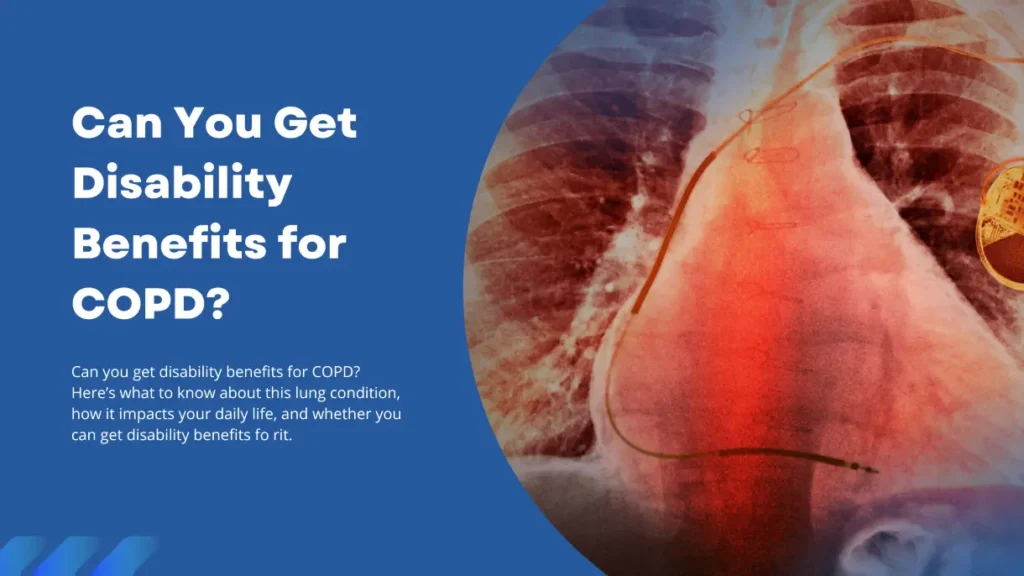Living with COPD is tough, it affects your ability to do everyday things. Knowing if COPD qualifies for disability is key if you need financial help. COPD, or chronic obstructive pulmonary disease, significantly impacts lung function, making it hard to breathe and work. This article will explore if COPD qualifies for disability benefits, how to apply, and what to expect during the process. Learn essential facts to help navigate the complexities of obtaining disability benefits for COPD.
Ready to see if you may qualify? Click here to get a FREE, no-obligation consultation before starting your claim.
Getting Social Security Disability for COPD: Key Takeaways
- COPD as a Disability: COPD is recognized as a disability if symptoms prevent working or handling daily activities.
- Medical Evidence: Essential medical evidence includes a doctor’s diagnosis and tests like spirometry, pulse oximetry, and blood tests.
- Types of Benefits: You can apply for SSDI or SSI benefits based on work history and income levels.
- Supporting Conditions: Secondary conditions like insomnia and anxiety can strengthen disability claims.
- Legal Support: Working with a disability lawyer can significantly improve your chances of approval.
What is COPD? Symptoms and Side Effects
Chronic Obstructive Pulmonary Disease (COPD) includes conditions like chronic bronchitis and emphysema, caused by cigarette smoke, dust, pollutants, and genetic factors like alpha-1 deficiency. Those affected experience a variety of symptoms that affect daily living and quality of life.
These symptoms include shortness of breath, wheezing, chest tightness, chronic coughing, increased mucus production, weight loss, and swelling in the legs. Knowing these symptoms is key to managing COPD and seeing if you qualify for disability due to the impact on work and daily activities.
Stages of COPD
Knowing the stages of COPD is key to understanding how symptoms progress and to see if you qualify for disability. Here’s what to expect from each stage of COPD:
- Stage 1 (Mild): Symptoms are present but not severe enough to qualify for disability. You may have occasional shortness of breath and mild cough.
- Stage 2 (Moderate): Symptoms are more noticeable and may include increased shortness of breath and chronic cough. You can qualify for disability, especially with secondary conditions.
- Stage 3 (Severe): Symptoms affect daily activities and work ability. Frequent exacerbations and hospitalizations are common, you can qualify for disability.
- Stage 4 (Very Severe): Symptoms severely limit physical activity and quality of life. You will likely qualify for disability due to the significant impact on lung function and overall health.
Disability Criteria From the SSA
To qualify for Social Security disability benefits, the SSA requires that your medical condition significantly limits your ability to perform basic work activities for at least 12 months. You must provide comprehensive medical evidence, including doctors’ diagnoses, treatment records, and results from specific medical tests. The SSA evaluates whether your condition meets or equals a listing in their Blue Book, which outlines impairments considered severe enough to prevent substantial gainful activity. Additionally, they assess your Residual Functional Capacity (RFC) to determine if you can adjust to other types of work despite your condition.
Is COPD a Disability According to the SSA?
The SSA considers COPD a disability if it significantly impairs your ability to work and perform daily activities. To qualify, you must provide medical evidence demonstrating that your COPD meets or equals the criteria listed in the SSA’s Blue Book under chronic respiratory disorders. This includes detailed medical records, test results such as spirometry and blood tests, and documentation of how COPD affects your daily life and work capacity. The evaluation also includes an assessment of your Residual Functional Capacity (RFC) to determine if any type of work is possible despite your condition.
SSA Disability Requirements for Respiratory Disorders
The SSA’s Blue Book lists various respiratory conditions that may qualify for disability benefits, such as chronic obstructive pulmonary disease (COPD), asthma, cystic fibrosis, and pulmonary fibrosis. To qualify, these conditions must be well-documented with detailed medical evidence, including doctors’ diagnoses, treatment history, and specific tests such as spirometry, chest X-rays, and arterial blood gas studies. The evidence must demonstrate that the respiratory disorder significantly limits your ability to perform basic work activities for at least 12 months. An assessment of your Residual Functional Capacity (RFC) is also conducted to determine your work capability. For more detailed information, you can refer to the SSA’s Blue Book.
Does Your RFC Mean There’s No Work You Can Do?
The Residual Functional Capacity (RFC) assessment evaluates your ability to perform work-related activities despite your medical condition. If your RFC indicates severe limitations that prevent you from performing any past relevant work or adjusting to other types of work, you may qualify for disability benefits. The SSA considers factors such as physical abilities, mental capacity, and the impact of symptoms on your daily life. Detailed medical evidence and documentation of how your condition affects your work capacity are crucial for a favorable RFC assessment.
How Hard Is It to Get Disability for COPD?
Qualifying for disability benefits with COPD can be challenging, as it requires substantial medical evidence and thorough documentation. The severity of your symptoms, the stage of COPD, and the impact on your daily activities and work capacity play significant roles in the approval process. Those with advanced stages of COPD, frequent hospitalizations, and additional medical conditions may have an easier time qualifying. Persistence in gathering comprehensive medical records, and possibly seeking assistance from a disability lawyer, can improve your chances of approval.
Which COPD Symptoms Might Limit Your Ability to Work?
COPD symptoms can significantly impact your ability to work. Persistent shortness of breath makes physical tasks challenging, while chronic cough and wheezing can disrupt concentration and productivity. Fatigue and frequent hospitalizations due to exacerbations further hinder work performance. Additional symptoms like chest tightness and mucus production complicate breathing and daily activities. Together, these symptoms reduce overall work capacity and may necessitate frequent breaks or absences, making it difficult to maintain consistent employment.
Other Medical Conditions & Comorbitites That May Help You Get Disability for COPD
Having additional medical conditions or comorbidities can strengthen your case for disability benefits. Conditions like coronary artery disease, high blood pressure, diabetes, and insomnia can exacerbate COPD symptoms and further limit your ability to work. Documenting these comorbidities with thorough medical records and demonstrating how they compound the effects of COPD is crucial. The combined impact of these conditions on your daily life and work capacity can significantly improve your chances of qualifying for disability benefits.
Medical Evidence You’ll Need for Your COPD Disability Claim
Collecting comprehensive medical evidence is vital for a successful COPD disability claim. This evidence supports your case by detailing the extent of your condition and its impact on your ability to work.
Medical Records
Thorough medical records are essential for your COPD disability claim. This includes your doctor’s diagnosis, treatment history, and detailed hospital records. Consistent and comprehensive documentation strengthens your claim.
Medical Evidence
Required medical evidence involves results from various tests like spirometry, pulse oximetry, DLCO, and arterial blood gas (ABG) analysis. These tests should show a decline in lung function over time despite treatment.
Evidence that Work Triggers Your Symptoms
Documentation showing that your work environment exacerbates COPD symptoms is crucial. This can include doctor’s notes and personal logs detailing how work-related activities worsen your condition.
Proof of Other Conditions
Providing evidence of additional conditions such as coronary artery disease, diabetes, or high blood pressure can support your COPD disability claim. Detailed records of these comorbidities highlight their impact on your ability to work.
How to Apply for COPD Disability Benefits
Applying for disability benefits due to COPD involves understanding the specific processes for Social Security Disability Insurance (SSDI) and Supplemental Security Income (SSI). Proper documentation and knowledge of the steps can enhance your chances of approval.
Applying for Social Security Disability Insurance (SSDI) With COPD
SSDI benefits require a substantial work history and comprehensive medical evidence. You can apply online or at a local Social Security Administration (SSA) branch. Benefits cover essential expenses like medical bills and living costs, with the average SSDI payment in 2024 being approximately $1,537 per month.
To qualify for SSDI, you must have earned enough work credits through your employment history. Typically, you need 40 credits, 20 of which were earned in the last 10 years. In 2024, one work credit is earned for every $1,640 in wages or self-employment income. Although there is no specific income limit for SSDI, substantial gainful activity (SGA) limits apply; for non-blind individuals, the SGA limit is $1,550 per month.
When applying, gather comprehensive documentation including your doctor’s diagnosis, treatment history, and test results like spirometry and blood gas analysis. Highlight how COPD affects your ability to work and perform daily activities. Submit your application through the SSA website or at a local SSA office. The SSA will review your medical records and work history to determine eligibility. Accurate and thorough medical documentation is crucial for proving the severity of your condition and its impact on your daily life.
Applying for Supplemental Security Income (SSI) With COPD
SSI benefits are designed for individuals with limited income and assets. Unlike SSDI, SSI does not require a specific work history, making it accessible to those who haven’t earned enough work credits. The maximum federal SSI payment in 2024 is $943 per month for an individual.
To qualify for SSI, your income and resources must fall below certain limits set by the SSA. As of 2024, an individual must have less than $2,000 in countable resources. The application process involves providing comprehensive medical documentation, including a doctor’s diagnosis, treatment history, and test results such as spirometry and blood gas analysis. Demonstrating how COPD affects your daily life and ability to work is crucial for approval. You can apply for SSI online or at a local SSA office.
When applying, gather thorough documentation to support your claim. This includes medical records, tests, and personal logs that detail how COPD impacts your ability to perform daily tasks and maintain employment. Accurate and detailed documentation increases the likelihood of your application being approved.
Work With a Disability Lawyer to Improve Your Odds of Approval
Working with a disability lawyer can significantly improve your chances of approval. A lawyer can help navigate the complex application process, ensuring all necessary documentation is collected and accurately presented. Their expertise in understanding SSA requirements and preparing a strong claim can be invaluable. Lawyers can also represent you during appeals if your initial application is denied, which is common for many first-time applicants. With their assistance, you can effectively address any challenges and increase the likelihood of a favorable outcome.
Ready to see if you may qualify? Click here to get a FREE, no-obligation consultation before starting your claim.

